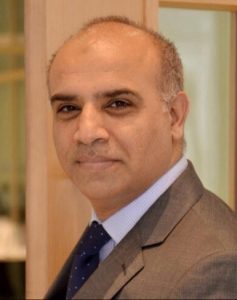Mahjoob Zweiri is an associate professor in contemporary history of the Middle East in the Humanities Department and graduate faculty in the Gulf Studies program at Qatar University. He lives in Qatar and has been a member since 2011.
 Twitter handle: @mzweiri
Twitter handle: @mzweiri
Alma mater/s: BA, University of Jordan, 1991; MA, University of Jordan, 1995; PhD, Tehran University
Fields of interest: contemporary history and politics of the Middle East, history of Iran, history and media, social history
When did you first develop an interest in history?
I was passionate about history since I was 10 years old. History is the efforts of humans, without humans there is no history. History is about today, how people and societies get to what they have become. History becomes more important and influential when it is approached from an interdisciplinary perspective. Engaging history with other fields such as sociology, economics, politics, etc. helps to reach better understanding of history.
What projects are you currently working on?
I have a joint-edited book Interdisciplinarity in World History: Continuity and Change that will be published soon by Cambridge Scholars Publishing. This volume is the outcome of international conferences organized by the Humanities Department at Qatar University.
Recently, I have also published a paper “Iran and Political Dynamism in the Arab World: The Case of Yemen” in the Digest of Middle East Studies.
Have your interests evolved since graduation?If so, how?
After graduation, my passion in history has increased; this was reflected in my teaching experience and research. I was able to teach history in three languages (English, Arabic, and Farsi) throughout the past 13 years. This made me appreciate the importance of knowing languages whether for research or for teaching.
I moved from the traditional approaches of teaching to the new ones where technology is used. This has serious and direct impact on the change of perception of the students. History is the field of knowledge that talks about dead people, yet it is alive, useful and even influential.
Is there an article, book, movie, blog etc. that you could recommend to fellow AHA members?
I recommend my joint-authored book Iran and the Rise of Its Neoconservatives: The Politics of Tehran’s Silent Revolution published by I.B Tauris.
What do you value most about the history profession?
History teaches how to put issues into context. Such skill allows historians to make better judgments about current and unfolded matters. I see history as a sensitive profession where the historian has a heavy responsibility towards the society and its future generation. We—as historians—are shaping the views of future generations towards their society, nation, and other societies and nations.
Why have you continued to be a member of the AHA?
Networking, and engaging in wide range of ideas presented by the different platforms of the AHA.
Other than history, what are you passionate about?
Politics, sociology, security studies, media and history, and political economy.
AHA members are involved in all fields of history, with wide-ranging specializations, interests, and areas of employment. To recognize our talented and eclectic membership, AHA Today features a regular AHA Member Spotlight series.
This post first appeared on AHA Today.
This work is licensed under a Creative Commons Attribution-NonCommercial-NoDerivatives 4.0 International License. Attribution must provide author name, article title, Perspectives on History, date of publication, and a link to this page. This license applies only to the article, not to text or images used here by permission.



